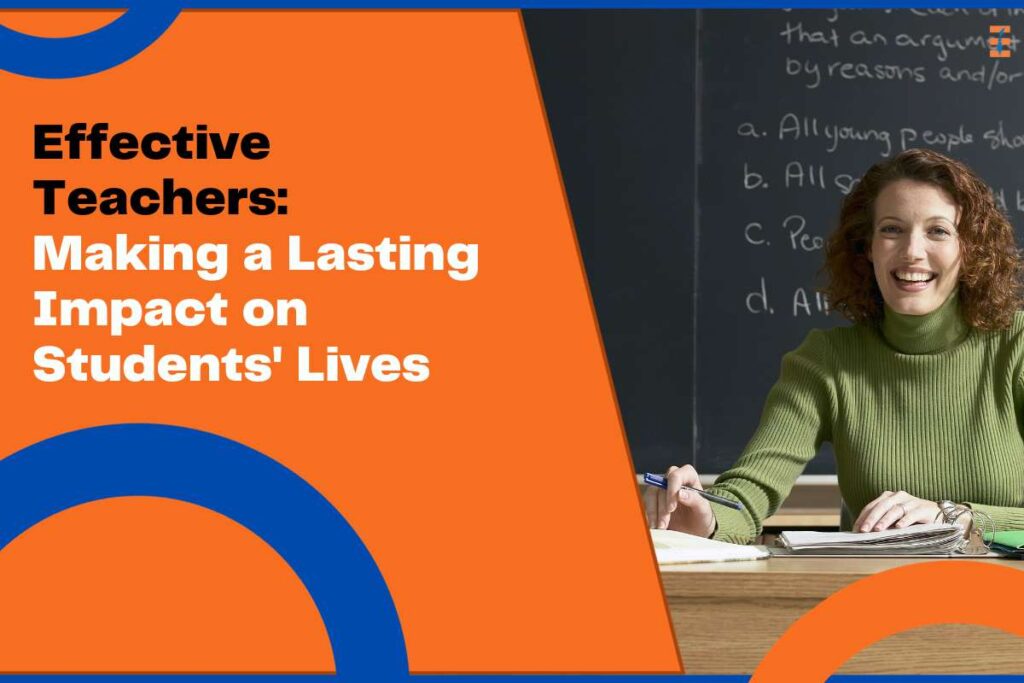Education is the key to personal growth, empowerment, and societal progress. Teachers are at the heart of this transformative process, guiding and mentoring students on their educational journey. Effective teachers not only impart knowledge but also inspire and motivate their students to become lifelong learners. They create a safe and nurturing environment where students can explore, question, and develop critical thinking skills.
Effective teaching is a multifaceted concept that goes beyond the traditional notion of conveying information. It involves understanding the diverse needs of students, adapting teaching methods, and fostering a positive and inclusive classroom culture. In this article, you will learn all the qualities, strategies, and experiences that characterize effective teachers and the lasting impact they have on their students’ lives.
Here are the qualities, strategies, and experiences of effective teachers:
Qualities of Effective Teachers
1. Passion for Teaching

Productive teachers are deeply passionate about their subject matter and teaching itself. This enthusiasm is contagious and can ignite a love for learning in their students. They constantly seek ways to make their lessons engaging and relevant.
2. Adaptability
Every student is unique, and good teachers understand the importance of adaptability. They tailor their teaching methods to meet the diverse needs and learning styles of their students, whether they are visual, auditory, or kinesthetic learners.
3. Empathy and Patience
Empathy and patience are essential qualities for efficient teachers. They understand that students come from different backgrounds and may face various challenges. By showing empathy and patience, teachers create a supportive and inclusive classroom environment.
4. Communication Skills
Good teachers are excellent communicators. They can convey complex ideas in a clear and understandable manner. Moreover, they actively listen to their students, encouraging open and honest dialogue.
5. High Expectations
Productive teachers set high expectations for their students. They believe in their students’ potential and encourage them to reach their full academic and personal potential. This expectation often becomes a self-fulfilling prophecy.
6. Creativity
Creativity in teaching is about finding innovative ways to engage students and make learning exciting. Efficient teachers use creative techniques, such as hands-on activities, storytelling, and multimedia resources, to make their lessons memorable.
7. Reflective Practice
Effective teachers engage in reflective practice, constantly evaluating and improving their teaching methods. They are open to feedback from students, colleagues, and self-assessment, using it to refine their approaches.
Strategies for Effective Teaching
1. Clear Objectives

Productive teachers begin each lesson with clear objectives. Students should understand what they are expected to learn and achieve by the end of the lesson. This clarity helps focus the learning experience.
2. Engagement
Engagement is crucial for effective teaching. Teachers use a variety of methods to engage students, such as interactive discussions, group activities, and multimedia resources. Engaged students are more likely to retain information and develop a deeper understanding of the subject.
3. Differentiated Instruction
Effective teachers recognize that students have different abilities and learning styles. They use differentiated instruction to tailor lessons to individual needs, providing extra support to struggling students and challenging advanced learners.
4. Feedback and Assessment
Feedback is a powerful tool for improvement. Capable teachers provide timely and constructive feedback on students’ work, helping them understand their strengths and areas for improvement. Formative assessment techniques, such as quizzes and peer evaluations, are also employed to gauge student progress.
5. Active Learning
Active learning encourages students to take an active role in their education. Proactive teachers design activities and projects that require students to apply what they’ve learned, fostering critical thinking and problem-solving skills.
6. Inquiry-Based Learning
Inquiry-based learning encourages students to ask questions, investigate, and discover answers independently. Passionate teachers guide students through the process of inquiry, helping them develop a sense of curiosity and research skills.
7. Real-World Connections
Efficient teachers connect classroom learning to real-world applications. They show students how the concepts they are learning are relevant to their lives and future careers.
The Impact of Proactive Teachers
Proactive teachers leave a lasting impact on their students that extends far beyond academic achievements. Here are some of the ways they influence students’ lives:
1. Inspiration and Motivation

Efficient teachers inspire and motivate their students to reach their full potential. They instill a love for learning and a sense of curiosity that stays with students throughout their lives.
2. Confidence and Self-Esteem
Belief in one’s abilities often begins in the classroom. Productive teachers build students’ confidence by recognizing and celebrating their achievements, no matter how small.
3. Critical Thinking and Problem-Solving
Effective teachers nurture critical thinking skills, empowering students to analyze information, evaluate evidence, and make informed decisions. These skills are invaluable in both education and life.
4. Resilience and Perseverance
Through challenges and setbacks, effective teachers teach students the importance of resilience and perseverance. They create an environment where mistakes are opportunities for growth.
5. Empathy and Compassion
Teachers who model empathy and compassion help students develop these essential social and emotional skills. These qualities contribute to building a more compassionate society.
6. Career Guidance and Aspirations
Effective teachers can influence students’ career choices and aspirations. They expose students to a wide range of possibilities and provide guidance on pursuing their interests and passions.
7. Lifelong Learning
Perhaps the most significant impact is the gift of lifelong learning. Efficient teachers nurture a hunger for knowledge that continues long after formal education ends.
Challenges and Rewards of Teaching
While teaching is a rewarding profession, it comes with its share of challenges:
1. Workload and Stress
Teachers often face heavy workloads, including lesson planning, grading, and administrative tasks. Managing classroom behavior and diverse student needs can also be stressful.
2. Limited Resources
Many teachers work in schools with limited resources, including outdated textbooks and inadequate facilities. This can make it challenging to provide the best possible education.
3. Standardized Testing Pressures
Standardized testing places pressure on teachers and students to perform well. This focus on test scores can sometimes overshadow the broader goals of education.
4. Diverse Student Needs
Every classroom is a diverse environment with students of various abilities, backgrounds, and learning styles. Meeting the individual needs of each student can be challenging, but it is essential for effective teaching.
Conclusion
Effective teachers are the unsung heroes of society, shaping the minds and hearts of future generations. Their passion, adaptability, and commitment to their students make a profound impact that lasts a lifetime. From inspiring a love for learning to nurturing critical thinking and empathy, proactive teachers contribute to the holistic development of their students.
As we celebrate and honor the contributions of teachers, it is essential to recognize the challenges they face and provide support to ensure they can continue to make a lasting impact. Effective teachers not only teach subjects; they teach life skills, values, and the limitless possibilities of the human spirit. In doing so, they shape a brighter and more promising future for us all.
Also Read: Setting SMART Goals: A Blueprint For Student And Teacher Success

